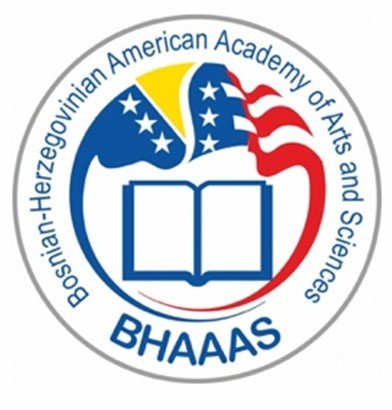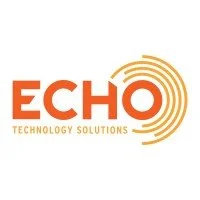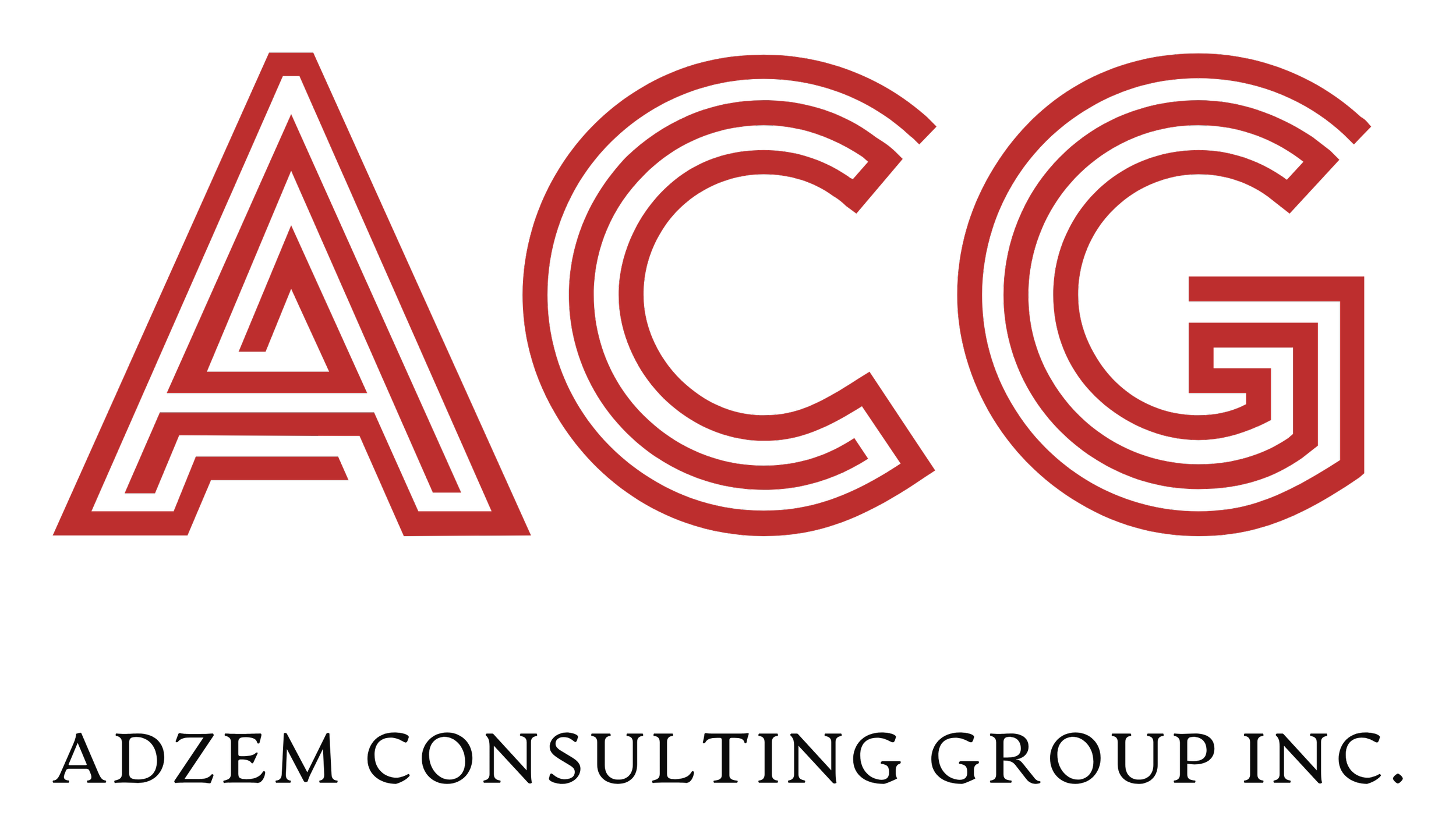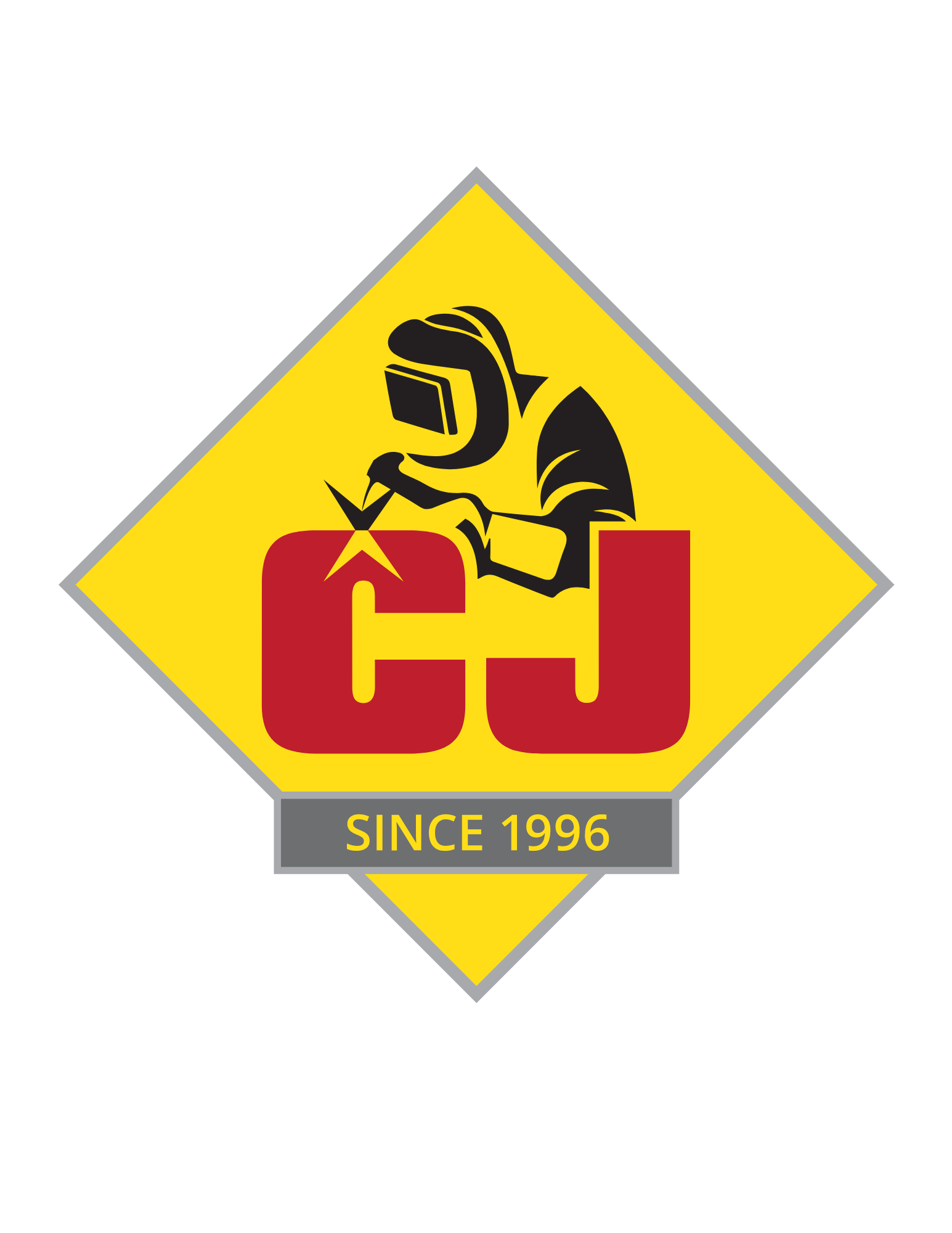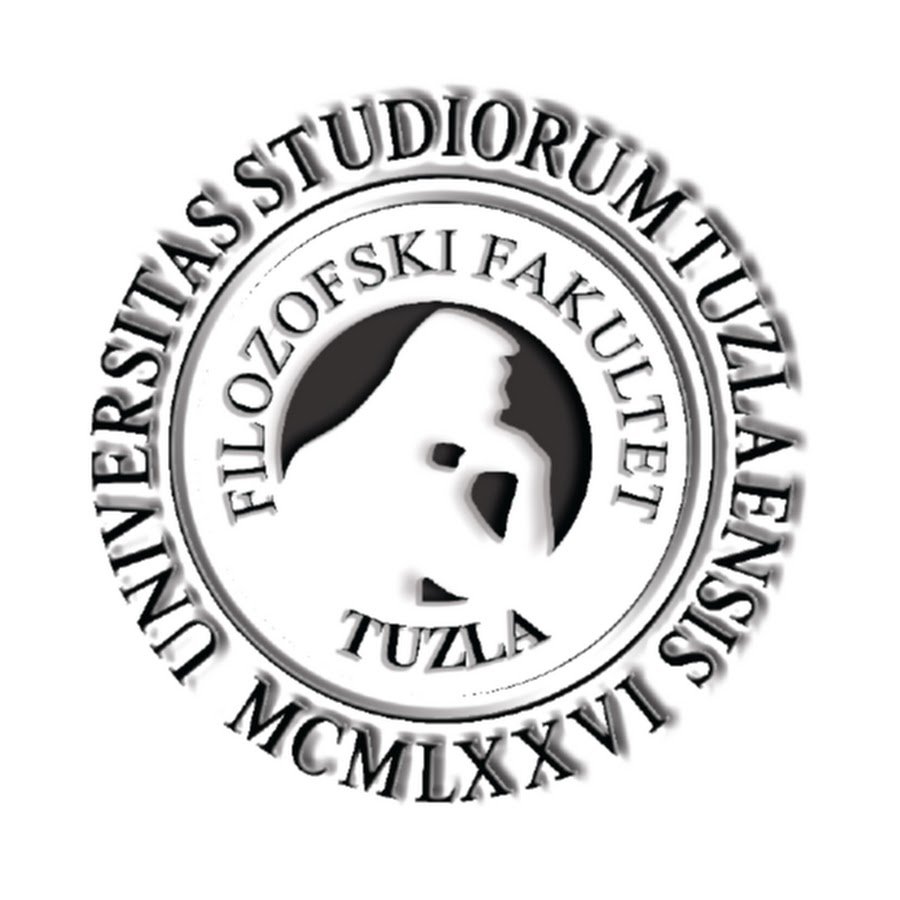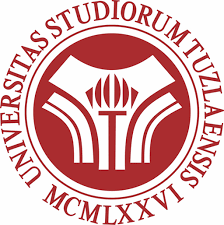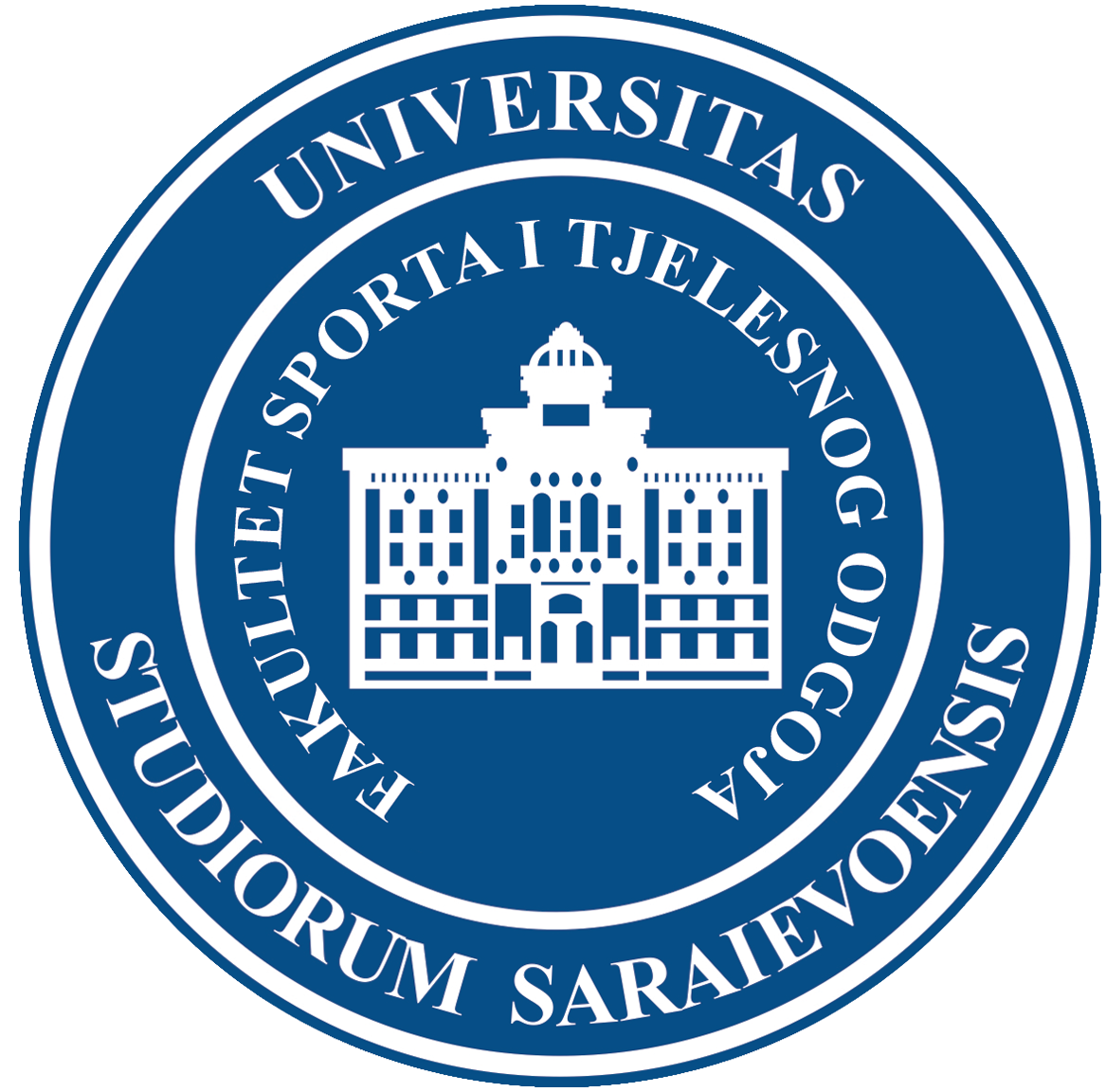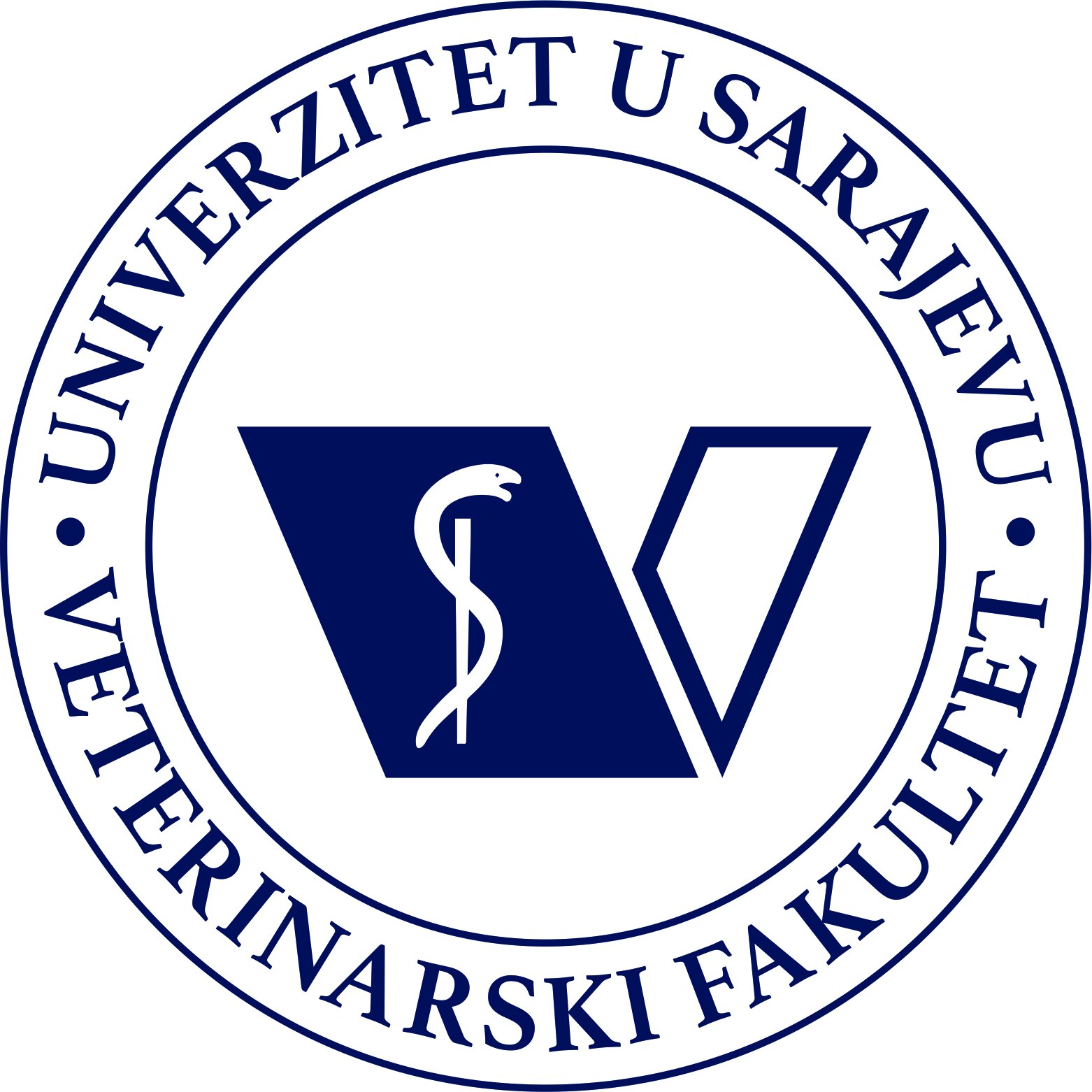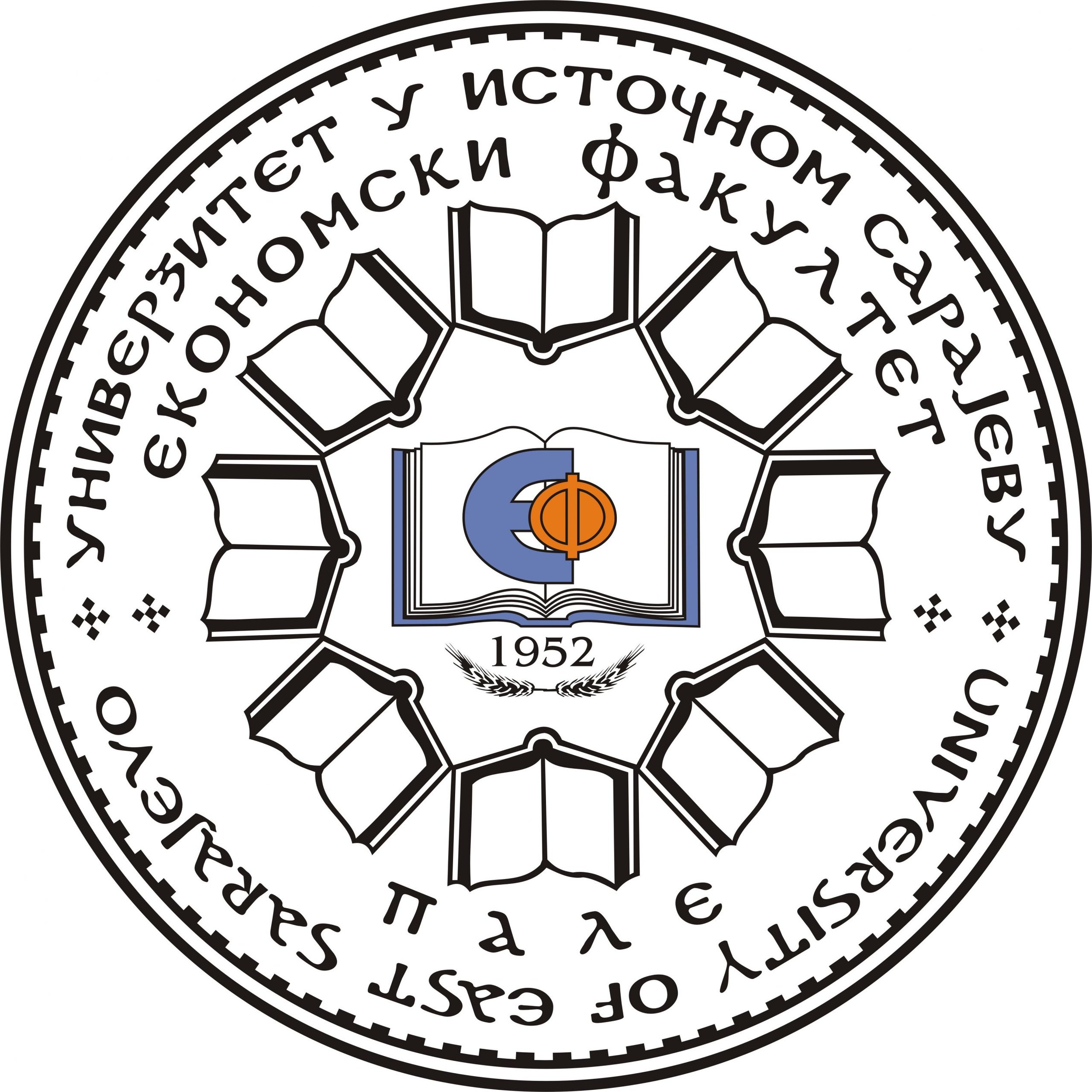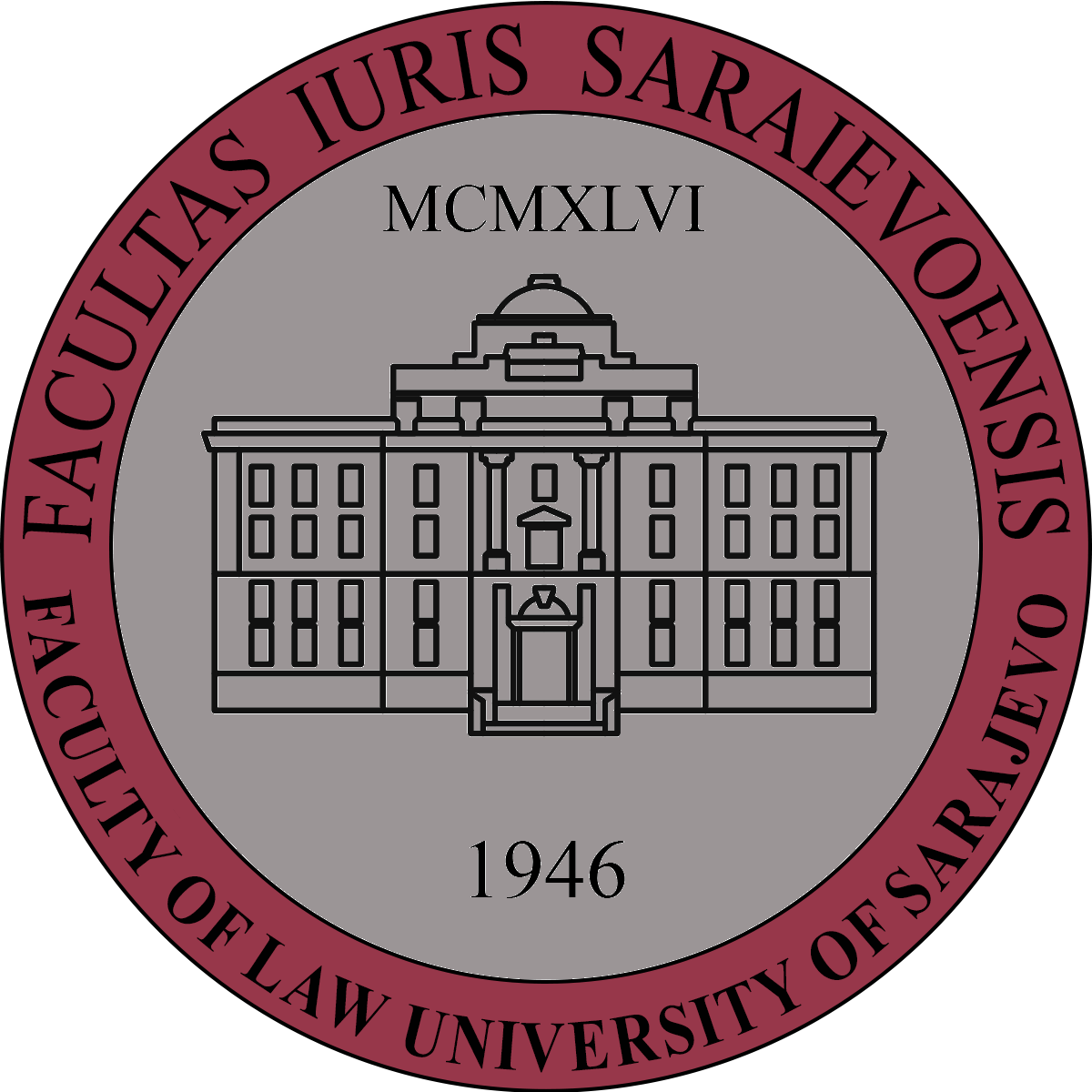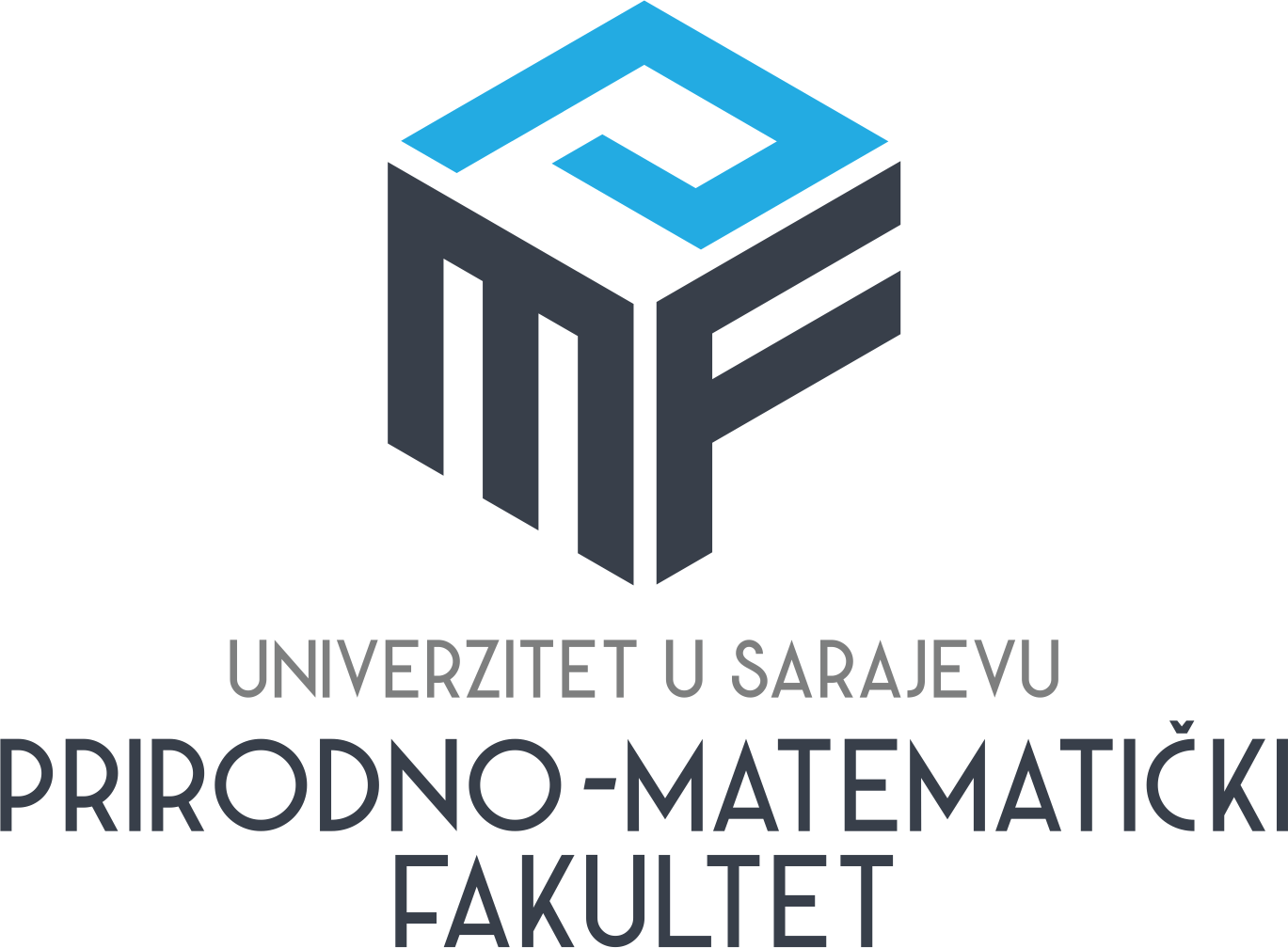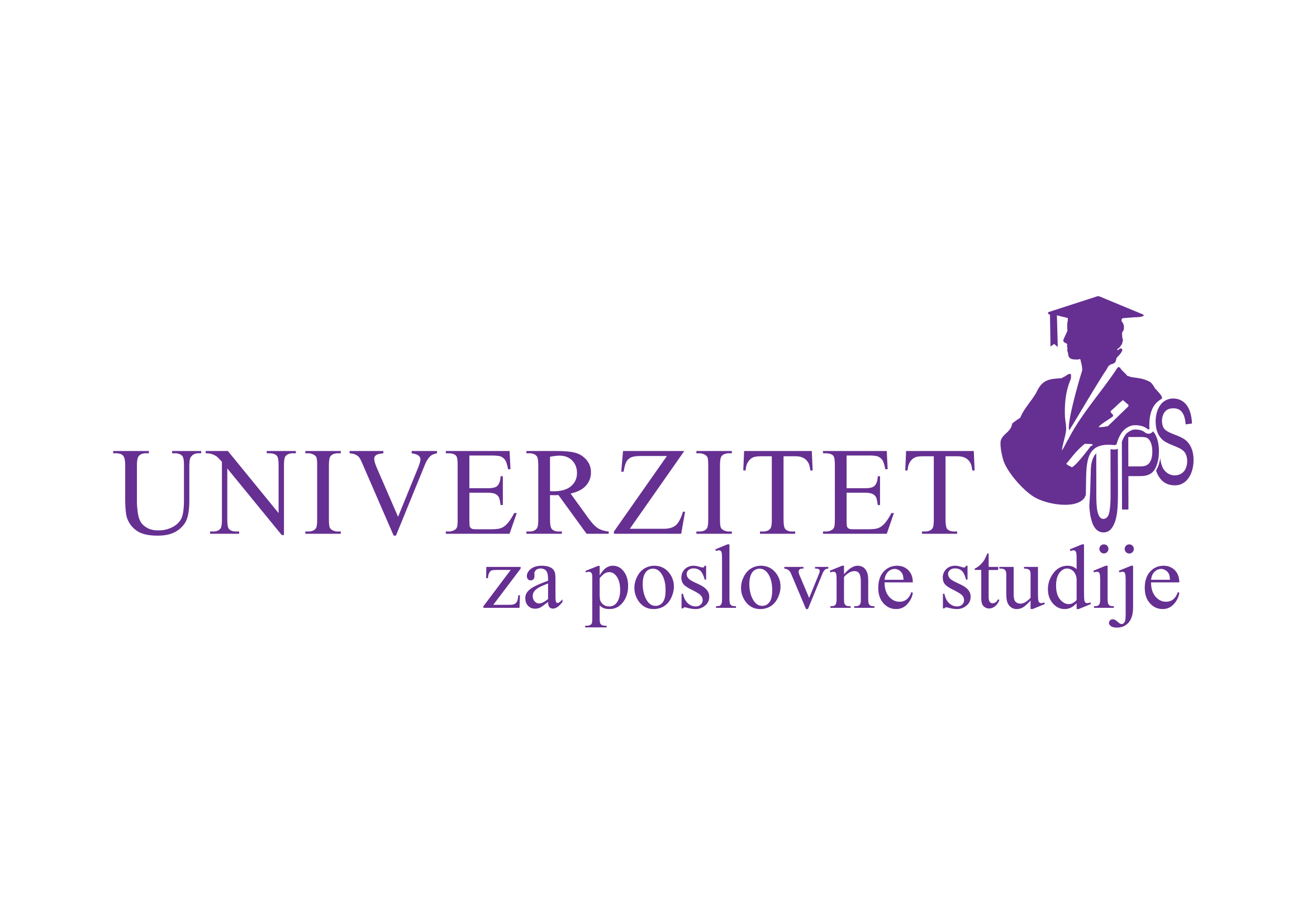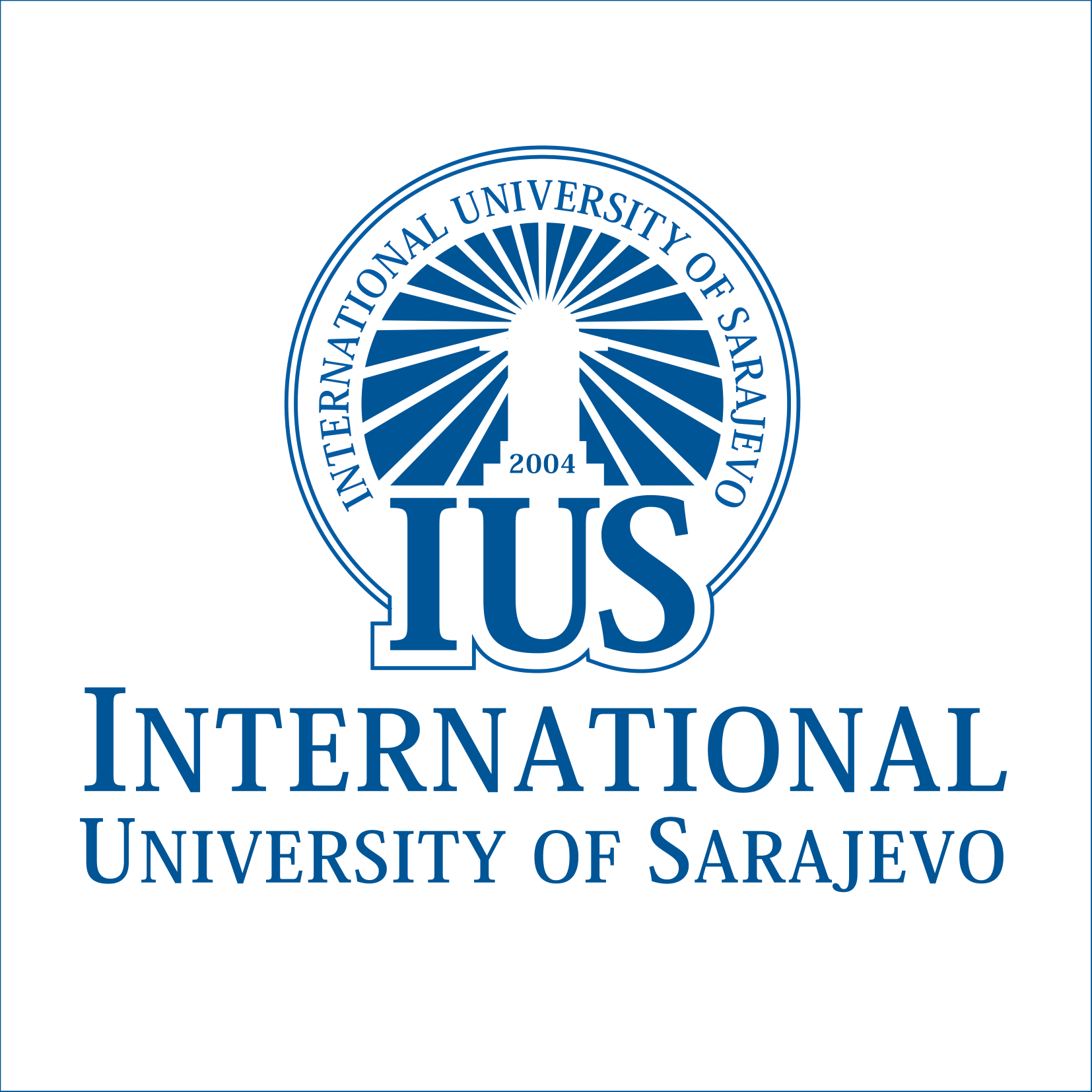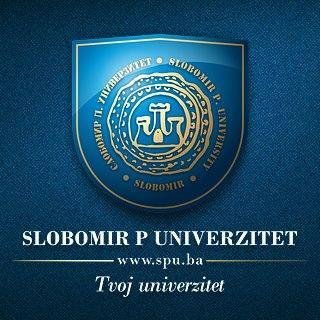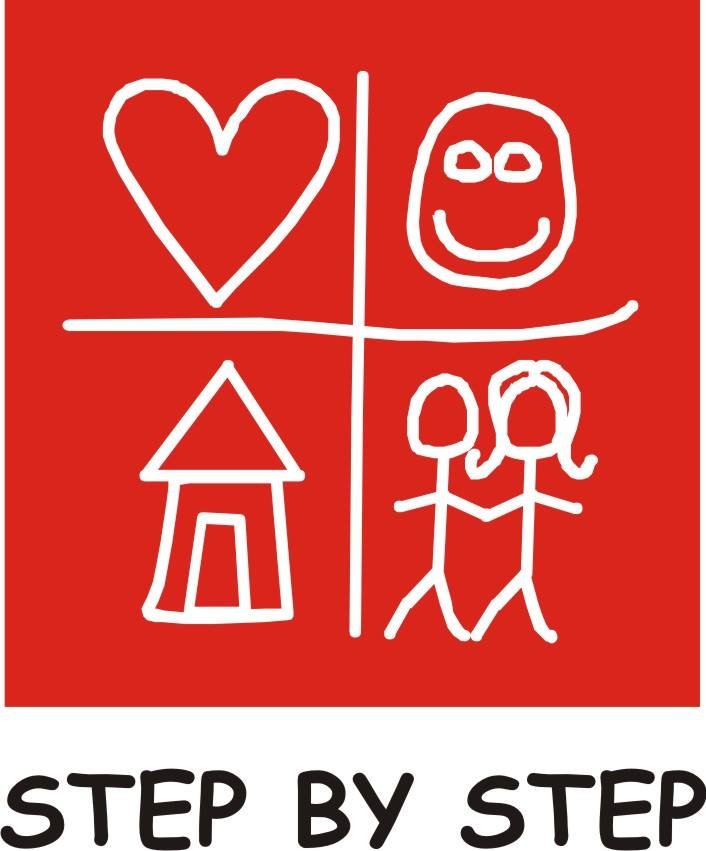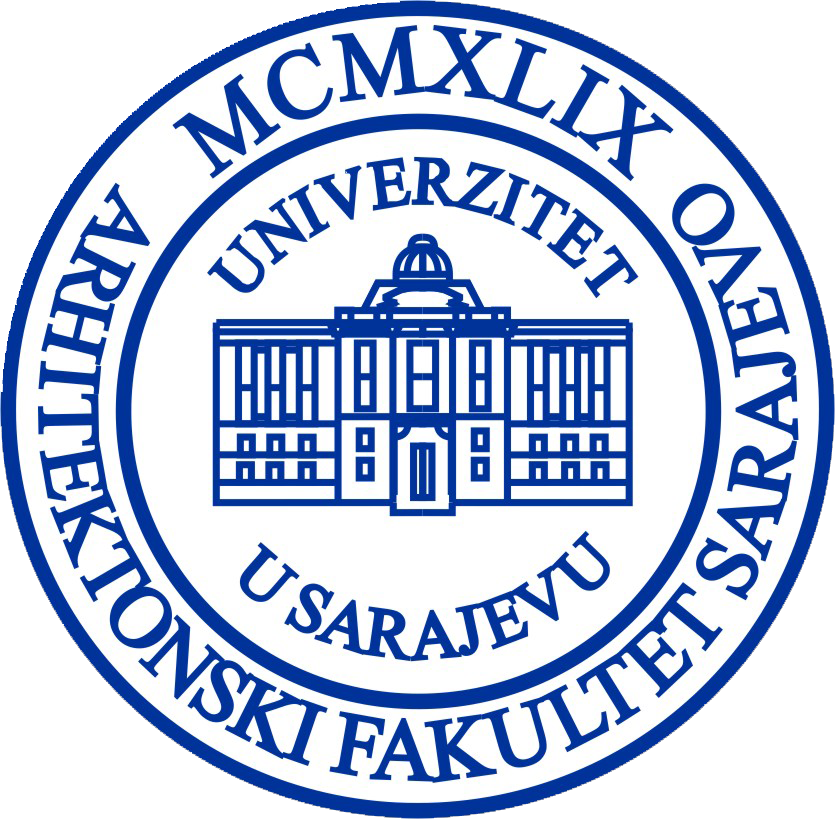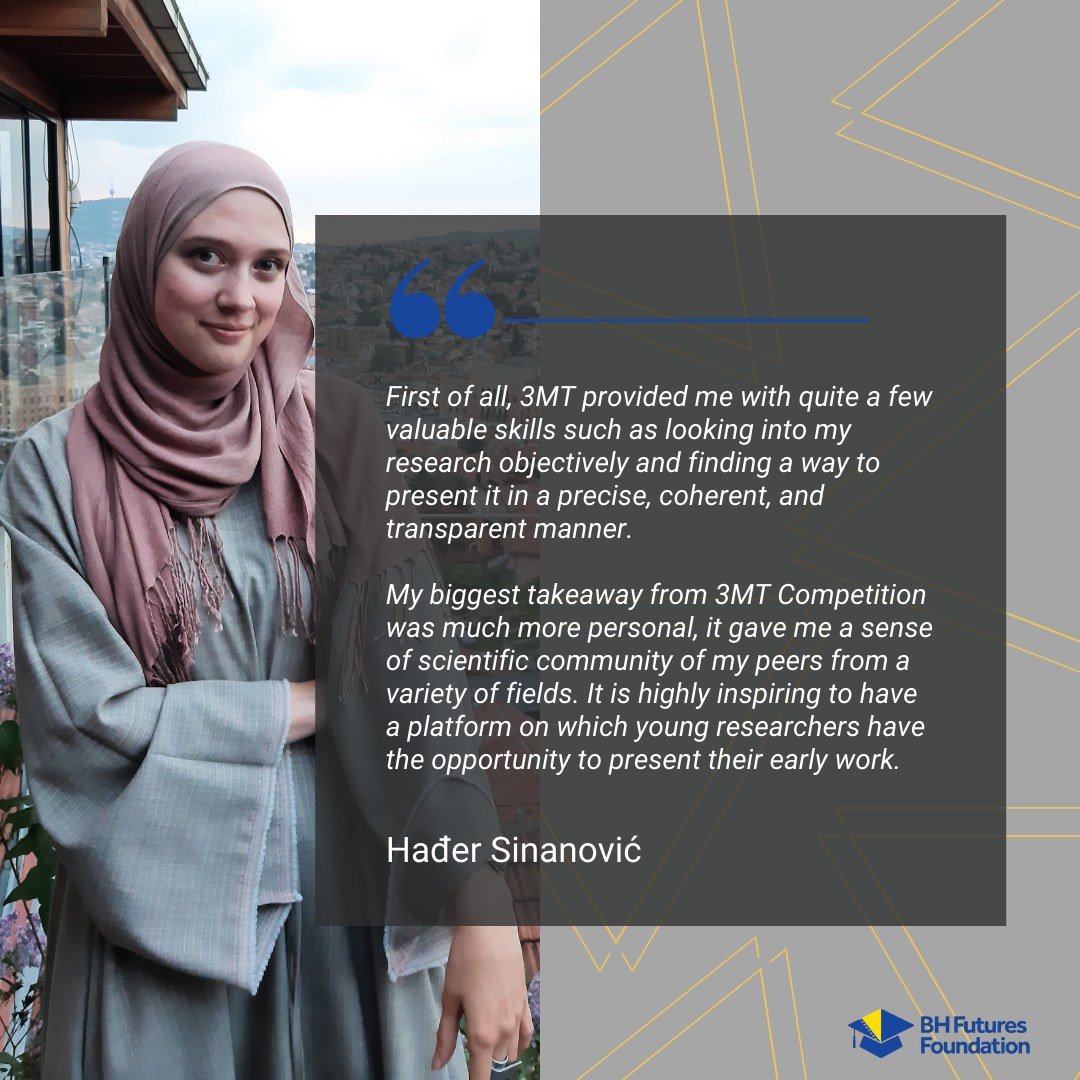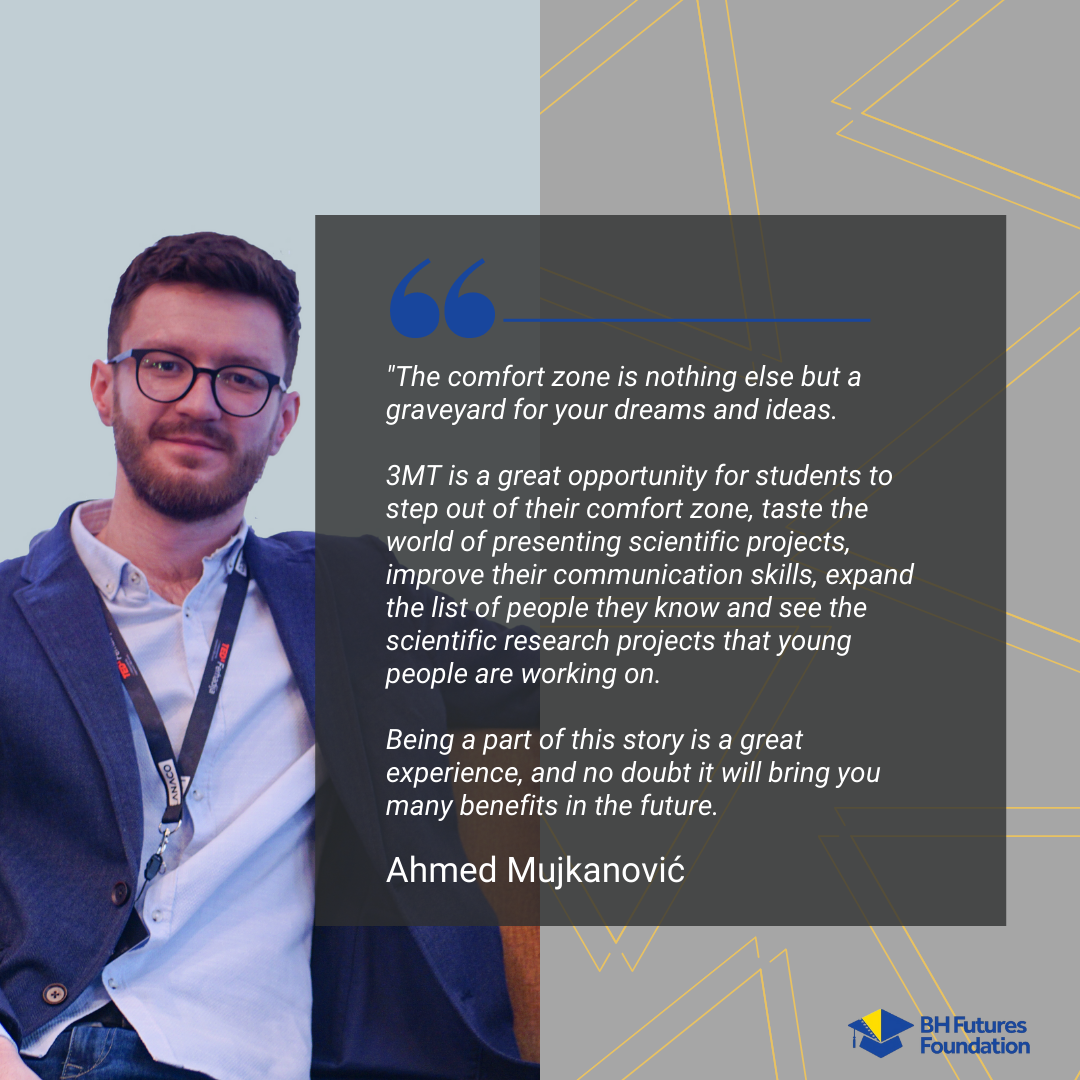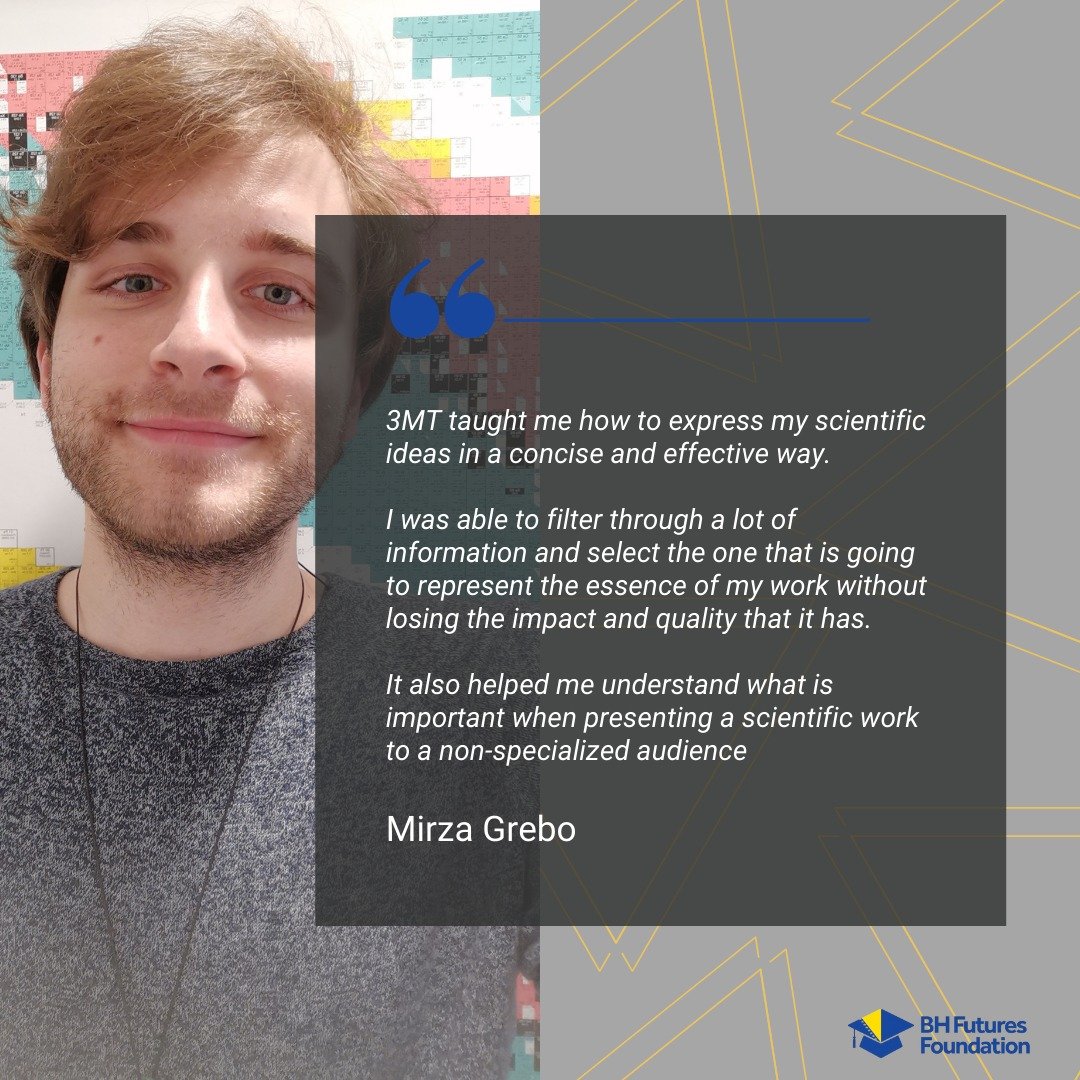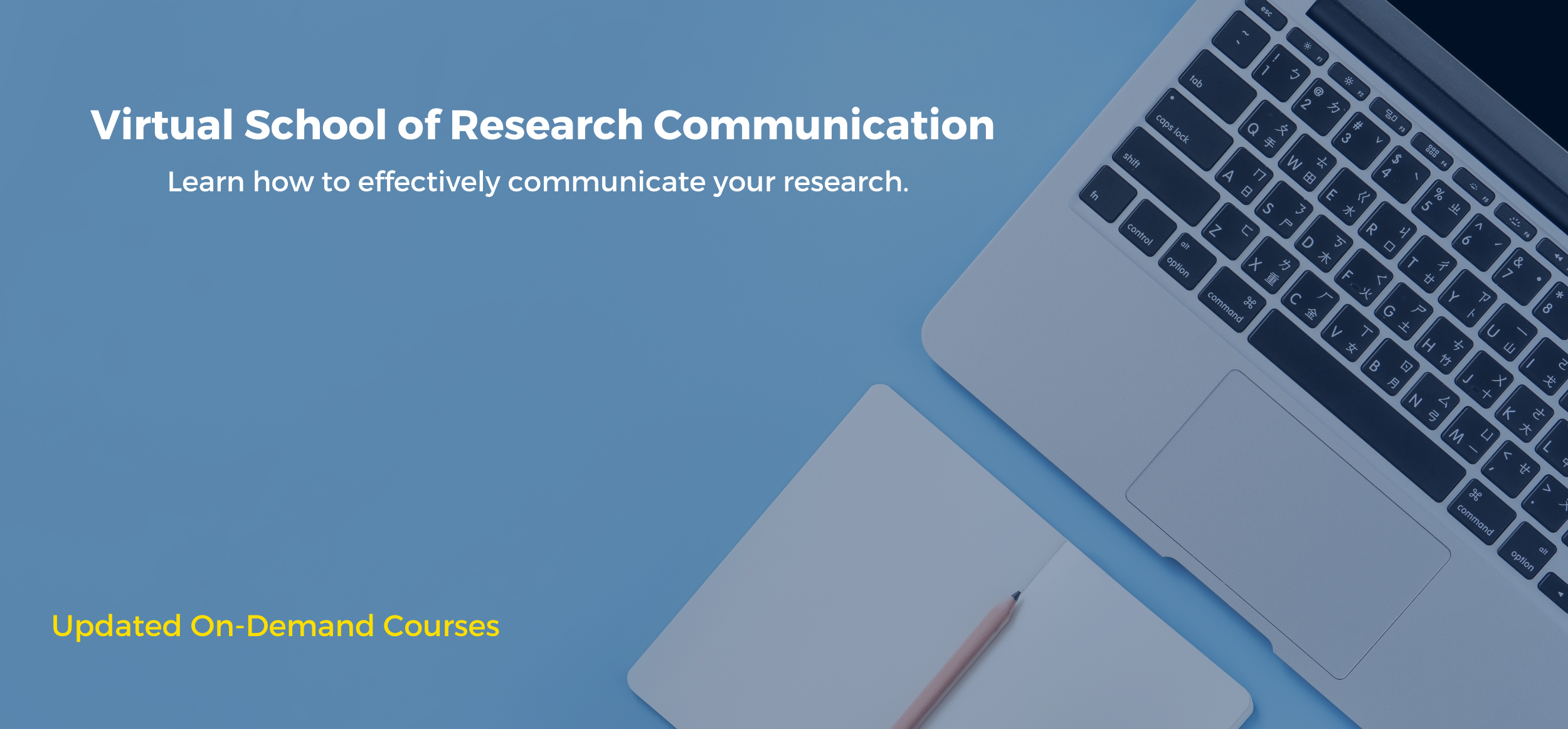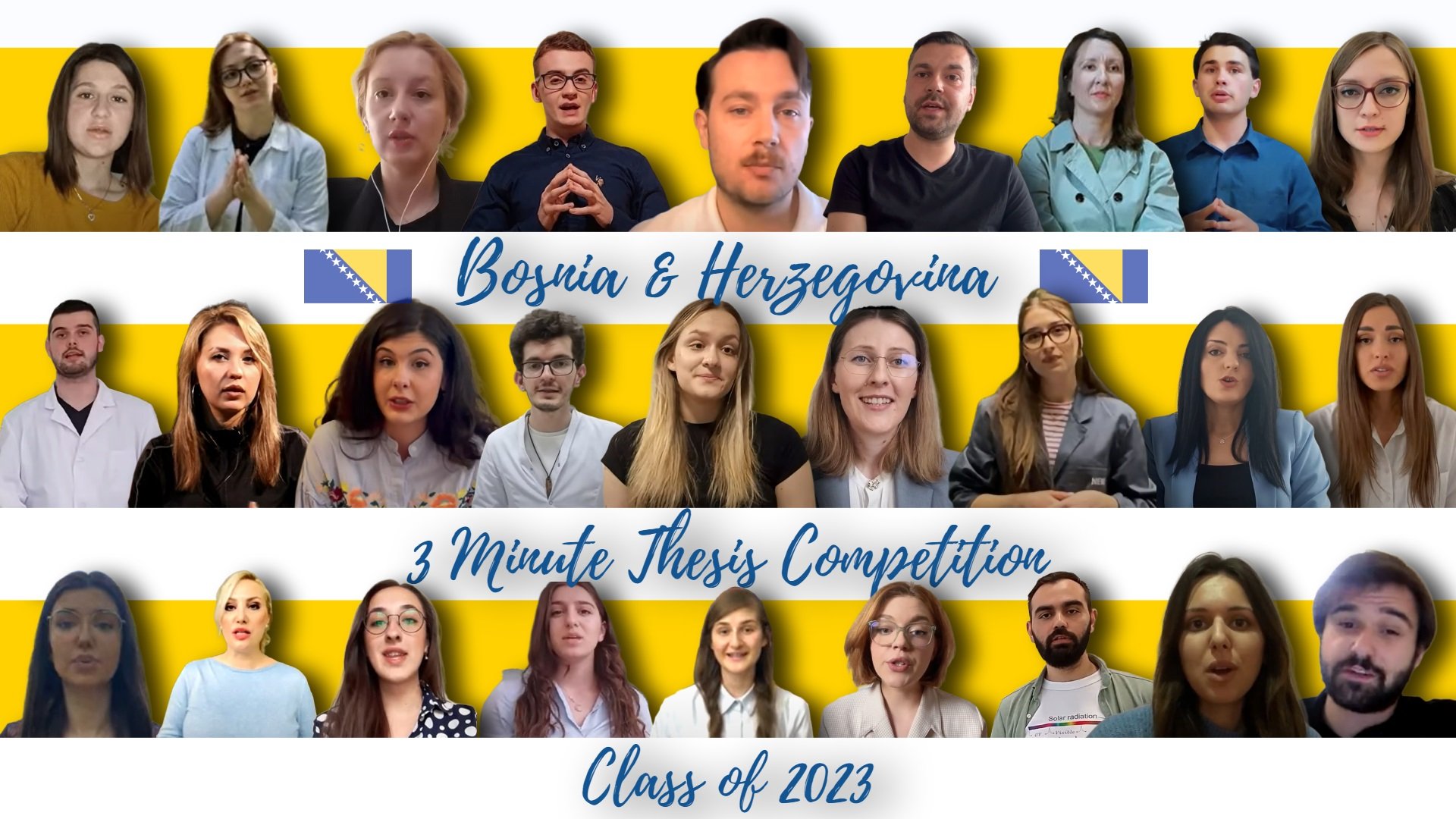ORGANIZING SPONSORS
FRIENDS OF 3MT
“The 2023 Bosnia & Herzegovina three-minute thesis (3MT) competition challenges students (Ph.D., Masters & Undergraduate) to communicate the significance of their research projects to a non-specialist audience in just three minutes and compete for over 20 000 BAM prize money.”
Applications will be open on 24th April 2023. Awards Ceremony: 24th June 2023
The 2023 Bosnia & Herzegovina 3MT competition provides Bachelor, Masters & Ph.D. students with the opportunity to develop their academic, presentation, research communication and community leadership skills by explaining their research to a non-specialist audience. In 2020, we successfully organised the inaugural competition in which Ph.D. students were the competitors. Following the success of the 2020 edition, we organised an equally successful competition for undergraduate/masters student researchers in the homeland but also abroad. The 3MT competition will be held virtually to allow anyone from anywhere to compete. Not only will students benefit from this experience, but their respective universities/faculties will have the opportunity to showcase their research and researchers throughout the Bosnia & Herzegovina network, as well as open doors to new collaborations and networks for both researchers and supervisors.
Students will have a maximum of three minutes to deliver a compelling presentation of one of the following:
Undergraduate, masters or Ph.D. dissertation (project) topic
Any other project/topic that was/is the part of their undergraduate/master dissertation
Any undergraduate or masters project (not just thesis) that has an element of research
3MT is not an exercise in trivializing or ‘dumbing-down’ research but forces students to consolidate their ideas and crystalize their research discoveries.
The competition will be judged by a local & international panel consisting of industry and academic professionals.
Why are we organising the 3MT competition and what do we hope to achieve?
The primary objective of the 2023 3MT initiative will be to bring talented young undergraduate, masters & Ph.D. researchers with Bosnia & Herzegovina origins together under one umbrella with Bosnia & Herzegovina origins and give them a platform to:
Engage with each other and a greater researcher community
Build a community of young researchers and lay the foundations for future collaboration
Disseminate important research information to the general public
Build partnerships and friendships between collaborating organisations
Showcase the global research excellence of Bosnia & Herzegovina
Boost personal careers by gaining visibility and improving communications skills
Connect prospective students with world class researchers of Bosnia & Herzegovina origins
Why you should participate?
Participation in the 3MT competition will allow students to develop many different skills. Former competitors have commented on the value of their experience in a variety of areas. Some highlighted reasons why you should participate:
Drastically improve your presentation skills and public speaking. Overcome public speaking anxiety and practice this important skill
Learn how to or enhance your research communication ability. Learn to effectively explain the breadth and significance of complex research to a non-specialist audience
Research perspective: Seeing how a research project fits within the larger picture is an important skill set. Distilling a research project into a three-minute general audience presentation allows participates to gain new perspectives on their research and helps contribute to their research and writing process
Build a global network: get to know other competitors from around the world, discuss your research and build long term friendships
Build key skills that are highly valued by employers in many sectors. These skills, such as public speaking and communication skills, can be featured prominently in application documents
Check out some great examples from our previous 3MT Competitions
How can you prepare yourself?
Virtual School of Research Communications
To better prepare for your 3MT presentation, we have created a specialized course. The Virtual School of Research Communications aims to educate participants on how to effectively communicate their research work to any audience and spark interest in the domain. The course is free and available on the Bosnia and Herzegovina Futures Foundation's course platform Futures e-Academy on demand. You can enroll here. The course is going to be updated with new content in February 2023. Read more about VSRC here.
Competition Rules
Undergraduate and Master students can present any project/assignment that was/is part of their official studies that contains elements of originality (literature surveys or reports without original/critical analysis are not appropriate). The kind of projects students can present will vary depending on a particular field of study (e.g. experimental or theoretical research, critical essay/report, artistic research)
Ph.D. student should present their doctoral research work only
Presentations are to be done in English (the international language of research) or local languages (Bosnian/Croatian/Serbian). However: Preference should be English
Presentations are limited to 3 minutes and competitors exceeding 3 minutes will not be allowed to compete
A single static slide (Visual aid) is permitted (no slide transitions, animations or 'movement' of any description)
The video can be recorded at home or another venue but must have only one camera angle filmed from a static position. You must be visible when presenting
The 3-minute audio must be continuous – no edits breaks etc. (This is why you must be visible at all times)
Presentations are considered to have commenced when a presenter starts their presentation through movement or speech
No additional electronic media (e.g. sound and video files) are permitted within the video recording. The focus is on your presentation skills
The decision of the judging committee is final
Judging
The judging is broken up into two sections with 5 criteria each. Each section is equally weighted. Each sections will be marked out of 5 (1 = weak, 5 = outstanding) and you will receive a score total out of 50. Judges will also provide comments for each presentation that can be used as justification for scores. Feedback can be provided to students upon request once the competition has concluded.
Comprehension and content
Did the presentation provide an understanding of the background and significance to the research question being addressed, while explaining terminology and avoiding jargon?
Did the presentation clearly describe the impact and/or results of the research, including conclusions and outcomes?
Did the presentation follow a clear and logical sequence?
Was the thesis topic, research significance, results/impact and outcomes communicated in language appropriate to a non-specialist audience?
Did the presenter spend adequate time on each element of their presentation - or did they elaborate for too long on one aspect or was the presentation rushed?
Engagement and communication
Did the oration make the audience want to know more?
Was the presenter careful not to trivialise or generalise their research?
Did the presenter convey enthusiasm for their research?
Did the presenter capture and maintain their audience's attention? Did the speaker have sufficient stage presence, eye contact and vocal range; maintain a steady pace, and have a confident stance?
Did the Visual Aid (slide/image) enhance the presentation - was it clear, legible, and concise?
Please note: Competitors *will not* be judged on video/ recording quality or editing capabilities (optional inclusions). However, you must presentation must be audible. Judging will focus on the presentation, ability to communicate research to a non-specialist audience, and 3MT visual aid (slide/image).
Please note: As decided by the judging committee, if an applicant does not have a slide/visual aid, then the mark for the previous category will be doubled.
Judges
Dženan Zukić, Kitware Inc., USA
Senada Zatagić, MEF University Istanbul, Turkey
Azra Zaimović, University of Sarajevo - School of Economics and Business, Bosnia and Herzegovina
Milan Vrucinic, Accenture (University of Cambridge Alumni), UK
Sabahudin Vrtagic, The American University of the Middle East (AUM), Kuwait
Vahida Velic, University of Sarajevo, Bosnia and Herzegovina
Maja Varatanovic, Veterinary faculty, University of Sarajevo, Bosnia and Herzegovina
Amina Tucak-Smajić, University of Sarajevo - Faculty of Pharmacy, Bosnia and Herzegovina
Anela Topčagić, University of Sarajevo, Faculty of Science, Bosnia and Herzegovina
Mirza Tihic, Syracuse University, USA
Una Tanovic, American University of Sharjah, United Arab Emirates
Amir Tabakovic, Netherlands Organisation for Applied Scientific Research (TNO), Netherlands
Merima Šabanovic, University of Oxford, UK
Emina Sunje, Faculty of Sceince Sarajevo, Bosnia and Herzegovina
Sabina Suceska - Karacic, Universitätsklinikum Bonn, Germany
Zlata Stankovic Ramirez, Coastal Carolina University, USA
Zorana Štaka, Faculty of Electrical Engineering, University of East Sarajevo, Bosnia and Herzegovina
Tanja Sović, Technische Universität Wien, Austria
Semra Smajic, University of Luxembourg, Luxembourg
Edin Smailhodzic, University of Groningen, Netherlands
Jelena Šimunović, University of Zagreb, Croatia
Elmedin Selmanović, University of Sarajevo, Bosnia and Herzegovina
Nermin Selimovic, Ansys, USA
Rijad Saric, La Trobe University, Australia
Samir Redzepagić, Monash University , Australia
Tariq Purivatra, University of Toronto, Canada
Emma Pinjic, Boston University School of Medicine, USA
Almir Peštek, School of Economics and Business in Sarajevo, Bosnia and Herzegovina
Svetlana Pelemiš, Faculty of Technology Zvornik, University of East Sarajevo, Bosnia and Herzegovina
Mirza Pasic, University of Sarajevo - Faculty of Mechanical Engineering, Bosnia and Herzegovina
Aleksandar Pajkanovic, Faculty of Electrical Engineering, University of Banja Luka, Bosnia and Herzegovina
Alma Oručević-Alagić, Lund University, Sweden
Nerkez Opacin, RMIT University, Australia
Merisa Nisic, minds+assembly, USA
Emir Nazdrajić, University of Waterloo, Canada
Adis Muminovic, University of Sarajevo, Bosnia and Herzegovina
Zlatan Mujkic, Eurosjaj, Bosnia and Herzegovina
Amir Mujkanovic, Academic Mentor, Austria
Azra Mujic-Delic, Genmab, Netherlands
Zlatan Mujagic, Maastricht University Medical Center, Netherlands
Harun Muhić, Infobip LLC Qatar, Qatar
Olivera Marjanovic, Macquarie University Australia, Australia
Irma Mahumtović-Dizdarević, University of Sarajevo - Faculty of Science, Bosnia and Herzegovina
Ismar Lutvikadic, University of Sarajevo - Veterinary Faculty, Bosnia and Herzegovina
Anela Lolic, Technical University of Vienna, Austria
Vernesa Lavic, Non-affiliated, Bosnia and Herzegovina
Larisa Kurtovic, University of Ottawa, Canada
Ehlimana Krupalija, University of Sarajevo, Faculty of Electrical Engineering, Bosnia and Herzegovina
Haris Krijestorac, HEC Paris, France
Galib Krdzalic, Owner: Dr. Krdzalic IT Consulting / Ex-CIO @ Schaeffler, Germany
Milana Komosar, Technische Universität Ilmenau, Germany
Emil Knezović, International University of Sarajevo, Bosnia and Herzegovina
Mladen Knežić, Faculty of Electrical Engineering, University of Banja Luka, Bosnia and Herzegovina
Vedran Karahodžić, Faculty of Electrical Engineering, University of Sarajevo, Bosnia and Herzegovina
Igor Karaca, Oklahoma State University, USA
Rijad Kaniza, Academy of Music and Fine Arts, UNSA, Bosnia and Herzegovina
Aida Kamišalić Latifić, University of Maribor, Faculty of Electrical Engineering and Computer Science, Slovenia
Jasmin Jahic, University of Cambridge, UK
Abdel F. Isakovic, Colgate University, USA
Dragan Huterer, University of Michigan, USA
Zelimir Husnic, Boeing, BDS, USA
Vedad Hulusić, Bournemouth University, UK
Sabina Hodžić, University of Rijeka, Faculty of Tourism and Hospitality Management, Croatia
Hana Hodzic, University of Sarajevo, Bosnia and Herzegovina
Eldad Herceg, Dow Inc., USA
Amila Haskic, University of Sarajevo, Bosnia and Herzegovina
Nino Hasanica, Institute for Health and Food Safety Zenica, University of Zenica, Bosnia and Herzegovina
Sandra Hasanefendic, Vrije Universiteit Amsterdam, Netherlands
Damir Hamamdzic, Johnson & Johnson, USA
Maja Halilovic Pastuovic, Trinity College Dublin, Ireland
Ajdin Halilovic, E.ON, Bosnia and Herzegovina
Riad Hajdarevic, Oslo University Hospital, Norway
Belma Hadziomerovic, Raiffeisen Bank , Bosnia and Herzegovina
Kajs Hadzic, University of Vienna, Austria
Azra Frkatović, Genos Glycoscience Research Laboratory, Croatia
Samir Forić, University of Sarajevo, Faculty of Political Science, Bosnia and Herzegovina
Emina Dzaferovic - Masic, University of Zagreb, Croatia
Zoran Đurić, Faculty of Electrical Engineering, University of Banja Luka, Bosnia and Herzegovina
Amel Durakovic, CEICO, Czechia
Nina Dumrukcic, University of Cologne, Germany
Darko Drakulić, NAVER LABS Europe, France, France
Anita Donlić, Princeton University, USA
Dalila Destanovic, University of Vienna, Austria
Bojan Derajić, Continental, Germany
Sabit Delic, MLL Munich Leukemia Laboratory, Germany
Ines Dedovic, Exentis Innovations GmbH, Germany
Eddie Ćustović, La Trobe University, Australia
Bojan Cudic, Digital Innovation Hub ONEX, Bosnia and Herzegovina
Amar Ćemanović, Istanbul Technical University, Turkey
Amir Čaušević, Univerzitet u Sarajevu-Fakultet zdravstvenih studija, Bosnia and Herzegovina
Nermina Brljak, USA
Sabina Brkić, NLB Banka d.d. Sarajevo, Bosnia and Herzegovina
Branko Blanuša, Faculty of Electrical Engineering, University of Banja Luka, Bosnia and Herzegovina
Sanja Bilic, SB Consulting, UK
Mirjana Beribaka, University of East Sarajevo, Faculty of Technology Zvornik , Bosnia and Herzegovina
Doc.dr Belma Memić, University of Sarajevo, Faculty of traffic and communications, Bosnia and Herzegovina
Demir Bektic, FINVIA, International University of Monaco, Technical University of Darmstadt, Germany
Vildana Bašić, Malmö university, Sweden
Merima Balic, University of Zagreb, Croatia
Maja Arslanagić-Kalajdžić, Unviersity of Sarajevo, Bosnia and Herzegovina
Ajla Ališah, Veterinarski fakultet, Bosnia and Herzegovina
Andi Alijagic, Örebro University, Sweden
Marinko Aleksić, HI "Poliex"Berane & Maritime faculty Bar, Montenegro, Montenegro
Amila Akagic, University of Sarajevo, Bosnia and Herzegovina
Kemal Aganovic, German Institute of Food Technologies DIL e.V., Germany
Nina Adjanin, Northwest Missouri State University, USA
Who can apply?
Born in Bosnia & Herzegovina / Have Bosnian citizenship or be considered diaspora (For example, if you were born in the USA but draw roots from Bosnia & Herzegovina you are eligible). You are also eligible if you were born in Bosnia & Herzegovina but are undertaking your undergraduate, master studies or Ph.D. in another country or in BH
Currently enrolled into an undergraduate/masters program OR completed studies in the last 12 months
Any discipline is eligible
Students who have not already presented the same or similar research in some of our previous 3MT competitions
Awards
We recognize the importance of this competition, its significance for research in the Bosnia & Herzegovina global community but also value your work and time.
Ph.D., Bachelor and Masters students will be judged separately.
There will be two types of awards. The first is judging conducted by an independent committee of academics and the second category of awards will be judged by the public.
Public voting is counted by the number of thumbs up on your YouTube video.
Undergraduate/Masters/Ph.D. total award pool is up to 20,000 BAM.
Awards for Ph.D. candidates
1st Place - 3000 BAM
2nd Place - 2000 BAM
3rd Place - 1000 BAM
4-10th Place - 100 BAM Amazon or http://kupipoklon.ba/ voucher
Awards for Master candidates
1st Place - 1500 BAM
2nd Place - 1000 BAM
3rd Place - 500 BAM
4-10th Place - 100 BAM Amazon or http://kupipoklon.ba/ voucher
Awards for Bachelor candidates
1st Place - 1500 BAM
2nd Place - 1000 BAM
3rd Place - 500 BAM
4-10th Place - 100 BAM Amazon or http://kupipoklon.ba/ voucher
Awards (judged by the public via YouTube)
Best overall presentation as judged by public (Ph.D.) - 1000 BAM
Best overall presentation as judged by public (Masters) - 500 BAM
Best overall presentation as judged by public (Bachelor) - 500 BAM
Best overall presentations – Special Awards
Best overall STEM presentation - 500 BAM
Best overall Humanities/Arts presentation - 500 BAM
Best overall Medical/Physical Sciences presentation - 500 BAM
Best overall Business/Economics/Law presentation - 500 BAM
3MT Alumni Choice Award – 500 BAM
Submission details & Application
Videos will be submitted by applicants via a website form (given below). The competitor should provide a link so that we can download your video. (please ensure your link is not set to private)
Your video submission can be in English or local languages (Bosnian/Croatian/Serbian).
If your video submission is in English, you will need to provide Bosnian/Croatian/Serbian closed caption or .srt file.
If your video submission is in Bosnian/Croatian/Serbian, you will need to provide English closed caption or .srt file.
There will be an initial screening to see eligibility and quality upon which the videos will be uploaded to our YouTube channel.
Videos will be uploaded on our YouTube channel and ready for full public sharing. This will be the primary hosting of videos.
In the Google form below, we must seek permission for the presentations to be publicly shared. Each competitor will need to make sure they check this with their supervisors and institutions. If selected into the finals, competitors will be notified. Their video shall be uploaded on the competition official YouTube channel.
Important Dates
applications open: April 15th - MAY 5TH, 2024
judging process and voting period: MAY 20th - June 9th, 2024
3MT Awards Ceremony and result announcement: June 15th, 2024 (online)
3MT & Research Meetup Sarajevo: June 22nd, 2024



